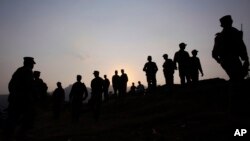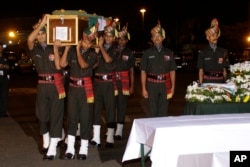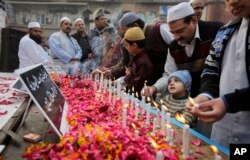Tensions between India and Pakistan are spoiling efforts to try to tackle the region's security problems, as the nuclear-armed neighbors have difficulty finding issues on which they can work together.
A regional conference that India recently hosted on Afghanistan fell hostage to a "[b]lame game, rather than constructive engagement," wrote Imtiaz Alam, a Lahore-based journalist and analyst, in his column for the English language The News.
Another regional conference, scheduled for last month in Pakistan, was canceled because of discord with India.
"I don't think you can have any kind of effective regional cooperation in which these two countries are involved until the India-Pakistan confrontation is resolved," said Ajai Sahni, executive director of the Institute for Conflict Management in New Delhi.
South Asia is not a well-integrated region, and few countries in the region are working together to address common problems. One of the few alliances developed to change that has struggled to perform. Under the best of circumstances, organizations like the South Asian Association for Regional Cooperation, or SAARC, have fought to be effective.
"Every meeting of SAARC used to turn into a confrontation between India and Pakistan," said Sahni.
Even in peacetime
The discord, however, has reached a new level.
"We always had high tensions during war or immediately after war, but we have not seen this type of negative sentiment during peace before," said Lahore-based political analyst Hasan Askari Rizvi.
India's Prime Minister Narendra Modi publicly announced a policy to try to isolate Pakistan internationally, after a September attack on an Indian army base in the disputed Kashmir region killed 18 soldiers. India blamed the attack on Pakistan-based militants.
SAARC, according to Michael Kugelman, a senior associate for South and Southeast Asia at the Washington-based Woodrow Wilson Center, could become one of the biggest casualties of that policy.
"With the India-Pakistan relationship in deep crisis, New Delhi has tried to use SAARC as a mechanism to isolate Pakistan," he said.
A recent conference held in the Indian city of Amritsar, called "The Heart of Asia — Istanbul Process," had a larger audience, with the United States, Russia, China and Turkey among those present. It was supposed to be about regional countries coming together to help strife-torn Afghanistan deal with its economic and security challenges.
Obvious tension
The conference unanimously approved a joint declaration that included language like "close regional cooperation aimed at promoting stability, peace and prosperity in Afghanistan," and demanded an "immediate end to all forms of terrorism, as well as all support to it."
Still, Sahni said, the declaration amounted to nothing more than a polite meeting among diplomats.
"You can have any number of declarations you like; that's not going to go anywhere," he said.
This time, however, the optics of tension became so obvious that, as Alam wrote in his column, Russia's special envoy to Kabul "had to lament the use of a multilateral forum for bilateral mudslinging."
The Indian leadership kept Pakistan's adviser to the prime minister on foreign affairs, Sartaj Aziz, who is the country's de facto foreign minister, mostly at arm's length. He was not allowed to hold a news conference with Pakistani media, citing "security concerns," and he did not meet bilaterally with any official of the host country.
"It made for riveting headlines, but in truth may have only set back further the cause of stability and peace in the region," read an editorial in Pakistan's largest English language daily, Dawn.
The two sides differ on the fundamental causes of this alienation.
Pakistan-based analysts say the Indian government is trying to whip up ultranationalist fervor.
"The state by itself is promoting extremism in the same way that Zia-ul-Haq did in his tenure," said Rizvi, referring to Mohammad Zia-ul-Haq, the late Pakistani president and military dictator. Haq is blamed for promoting a culture of Islamist extremism and intolerance in Pakistani society.
Terrorism claims
Many Indian officials and analysts blame Pakistan's continued support for terrorist groups, despite Islamabad's claims that it is fighting a war against all terrorist elements.
"There is no effort whatsoever to contain, control or neutralize the groups that are directed against Afghanistan and the groups that are directed against India," said Sahni.
Still, some are questioning the efficacy of a policy of disengagement.
"[I]f every window for engagement with Pakistan is closed for India and Afghanistan, the two countries must closely consider what their next step will be," wrote India's widely circulated English-language paper The Hindu, in an editorial.
"A lack of engagement may, in the short term, yield some pressure on Pakistan's leadership to act, as it did briefly after the Pathankot attack," said the paper, referring to a militant raid last January on an airbase in Pathankot, in Punjab state, that killed seven Indian soldiers. "But in the long run it may deplete the two countries of their limited leverage as Pakistan's neighbors."
New Delhi blamed the Pathankot attack on Pakistan-based militants. Islamabad denies any role in supporting cross-border terrorism.













